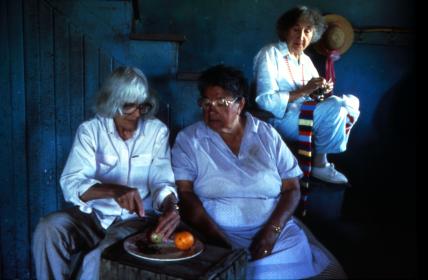

|
|||||
|
|
|
|
|
|
|
| Directed by Cynthia Scott |
| Canada, 1990 (fiction, 101 minutes, colour, English) |
| Also known as "Estranhos por companhia", "In compagnia di signore perbene", "Le fabuleux gang des sept", "Na Companhia de Estranhos", "Strangers in Good Company", "Unter Fremden", "Vieraiden seurassa" |

|
| Image: © National Film Board of Canada |
| Video (National Film Board of Canada) |
|
Film Description: "A bus breaks down in the wilderness. Eight elderly women, average age 71, are stranded at a deserted farmhouse. The have only their wits, their memories, and eventually some roasted frogs' legs, to sustain them. Through the long days and nights this remarkable group of strangers share their life stories and exchange intimate thoughts; turning the crisis into a magical time of humour and spirit. Featuring non-professional actors and spontaneous dialogue, this memorable film dissolves the barrier between fiction and reality, weaving a heartwarming tale of friendship and courage." -- National Film Board of Canada (source) |
| Film Credits (partial): | |
| Written by: | Gloria Demers |
| Produced by: | David Wilson, Colin Neale, Rina Fraticelli, Peter Katadotis |
| Principal Cast: | Alice Diabo, Constance Garneau, Winifred Holden, Cissy Meddings, Mary Meigs, Catherine Roche, Michelle Sweeney, Beth Webber |
| Cinematography: | David De Volpi, Roger Martin |
| Film Editing: | David Wilson |
| Music: | Marie Bernard |
| Production Company: | National Film Board of Canada / Office national du film du Canada |
"Unlike Hollywood 'women's films', The Company of Strangers offers no pat conclusions, no romantic fatal diseases and no weepy catharsis. Scott gets deeper inside the histories of these women than Hollywood would allow, and shows us truer, more complex relationships than those films can manage. The result is a surprising breakthrough drama."
-- Festival of Festivals
(source)
"From the moment the women first come into view through the haze of a summer's day, gingerly making their way across a grassy ridge, their advanced age is evident. [Cynthia] Scott's achievement is to take this for granted, refusing to offer stereotypical portraits. She endows her characters with authenticity by weaving real stories and real people into the fictional setting. Using non-actors, and with only the barest of scripts, the director has captured the drama of old age in a film [The Company of Strangers ] which is both moving and funny, but never sentimental."
-- Jill McGreal
(source)
"The book [In the Company of Strangers] is a meditation on the process of becoming unestranged from each other, and my own reflections on the way it was [during the making of the film]. We were in a very beautiful part of Quebec and the whole thing was the process of becoming company for each other. That's what the summer was about and that's what the film is about."
-- Mary Meigs
(source)
"When [The Company of Strangers] film premiered at the Venice Film Festival in 1990, it received a standing ovation from the audience. Alliance Distributing loved what they saw and bought the distribution rights for Canada. The film was released throughout Canada in the fall of 1990, to excellent response (it played for the incredible duration of 5 months at a Toronto cinema). Audiences and critics alike were delighted with the film. It was picked up by First Run Features stateside and released under the title Strangers in Good Company (to avoid confusion with the British film The Comfort of Strangers). The film was a big hit in the USA, playing just about everywhere. Total box office in the USA alone was over $1 million."
-- Albert Ohayon
(source)
"[The Company of Strangers] is a film on aging, with seven elderly women as its subject, that takes the form of a narrative precariously balanced between ethnography and performance, history and pathos. The delicate interweaving of documentary and fiction through the thematics of mortality and female bonding produces a very unusual spectatorial effect."
-- Catherine Russell
(source)
"Give this script, improvised from ideas by the late Gloria Demers, to any Hollywood executive, and the reaction would be, 'So! Where's the story?' [...] Only the National Film Board's excellent 'alternative drama' division would have been able to finance such a film, a film that reminds us that movies can entertain us with real albeit unremarkable lives."
-- Jay Scott
(source)
"Cynthia Scott's The Company of Strangers [...] is a disquisition on female aging, personal histories, memory, life and death, and the coexistence of past and presence. The film maps these topics onto the aged female body, a body imagined as active, mutable and vital even while it signals decay and mortality."
-- Angela Stukator
(source)
"Pour ne rien perdre de l'unique prise lors des dialogues et de la
spontanéité des interprètes, Cynthia Scott utilise deux caméras.
Contrepoints, des photos prises à différents moments de leur vie
apparaissent sur l'écran. La réalisatrice n'a pas craint les plans
rapprochés qui révèlent l'étrange beauté des visages vieillissantes,
certes,
mais encore pleins de vitalité."
-- Yves Lever
(source)
"Ce qui finalement fait le charme de ce film [The Company of Strangers], c'est la rencontre qu'il propose avec de vraies personnes. Elles qui n'ont rien de vedettes laissent transparaître dans leurs confidences ou leur manière d'être le poids de toute une vie."
-- Luc Perreault
(source)
"The Company of Strangers se révèle [...] une agréable surprise, d'autant plus que cette belle brochette d'actrices en était à ses premières armes devant la caméra. Issues de différents milieux, elles apprendront à s'ouvrir aux autres, à se livrer sur leur passé pas toujours rose, leurs amours, leur sexualité, leurs espoirs perdus et leurs rêves oubliés."
-- Normand Provencher
(source)
|
|
|
|
|
|
|